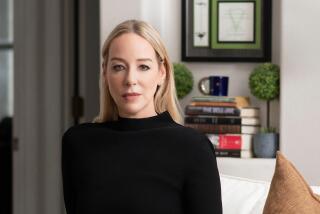BOOK REVIEW : The Deceptive Power of a Cad’s Ego
- Share via
The Grown-Ups by Victoria Glendinning (Knopf: $18.95; 244 pages).
Taking a temporary holiday from her definitive biographies of uncommon women, Glendinning has written a corrosive novel centering upon the personality of the philanderer-philosopher Leo Ulm.
Vain, arrogant and supremely selfish, Ulm nevertheless is able to turn sensible, talented women to jelly merely by raising a grizzled eyebrow and smiling his crooked grin. His celebrated magnetism is so obscure that “The Grown-Ups” virtually becomes a mystery story, as the reader struggles to understand wherein that charm lies.
Persevering, we realize that the despicable Ulm offers women something rare and precious--the chance to exhibit a full range of their strength and resilience. Like the biographies, this novel celebrates female accomplishment, if only by indirection.
Leo Ulm is dead as the book opens, felled by a cerebral hemorrhage at a Buckingham Palace garden party. As an author, professor and television personality, he rates a splendid obit in The Times, but it’s the life behind the honors and achievements that the author goes back and exposes, making the most of the huge gulf between the public and the private Ulm.
“In the 1960s he was the flower children’s favorite thinker,” and 20 years later, he’s still offering the same Pablum to a new generation. Now 58 years old, Leo Ulm has gone from boy wonder to grand old man without ever doing anything significant in the meantime.
Ulm’s current wife is Martha, a willing servitor half his age. A sought-after illustrator of children’s books, she squeezes her assignments in between Leo’s peremptory demands, quite unaware that he’s habitually unfaithful to her. Charlotte, the reclusive first wife, is installed in the guest cottage of the family estate she brought to her marriage with Leo. Their son, Ferdie Ulm, blinded in a childhood accident, lives in the manor house with his wife, Alice; their small daughter, Agnes, and the Swiss au pair. (Marriages may come and go, but inherited real estate is kept in the family.)
There’s more visiting back and forth between London, where Leo and Martha live, and Belwood, where he once resided with Charlotte, than one might expect. The trips provide Leo with opportunities for the sort of intermural seduction that so enlivens English country weekends.
While the feminist message is always implicit, “The Grown-Ups” is essentially a novel of contemporary manners, designed to amuse as it cautions. One way and another, Leo’s conquests are all acquiescent victims, coming to their senses only after the Almighty Equal Rights Adjuster removes him permanently from their lives.
On a professional junket to Washington, Leo expertly cases the delegates and selects a clever and alluring Frenchwoman as his diversion. Unfortunately, intelligence and sophistication are no defense against the overwhelming Ulm ego, and Emmeline Bernay becomes another casualty.
Unlike his wives, Emmeline eventually musters the energy to rid herself of the infatuation, baking and soaking away his memory in a warm Mediterranean bay. Neither Charlotte nor Martha is so lucky.
The Washington scenes are wickedly funny, satirizing international academics at work and play, permitting us to see Leo gulling his peers as readily as he deceives his lovers. There we observe the essential Ulm, preening as he enters the hotel lobby to a low mutter of recognition, imagining the sound of his name “like a mantra” to his admirers.
Encountering an elderly German colleague squiring his aged first wife from one event to another, Ulm cannot fathom why “men continue to dote on women who are no longer attractive or amusing.”
The incidental characters include a senescent and dotty relic of the Bloomsbury era, the effete young man who listens patiently to her tales of bygone high jinks, and Martha’s dear friend, Clara, struggling to have a postmodern relationship with a thoroughly conventional chap who works for an insurance company.
Though these various people have little direct bearing on the fundamental issue of the novel, they provide almost enough diversion to make us forget that “The Grown-Ups” never answers the question it raises. By the end of the book, we’re no closer to knowing why good women love worthless men than we were on Page One, though we may know what traits mean certain disaster.
More to Read
Sign up for our Book Club newsletter
Get the latest news, events and more from the Los Angeles Times Book Club, and help us get L.A. reading and talking.
You may occasionally receive promotional content from the Los Angeles Times.







